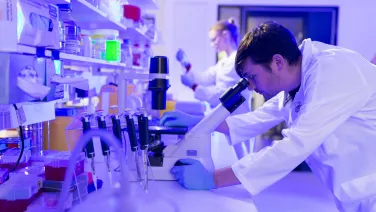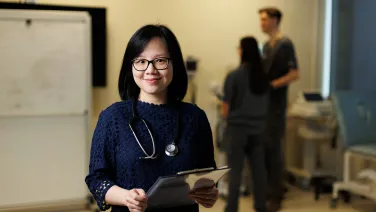
Graduating exceptional doctors able to provide superior patient care
Photo by Tracey Nearmy/ANU: Clinical Skills team, (l-r) Ms Abaq Mekki, Dr Janis Sauvé, Associate Professor Michelle Barrett, Dr Matt Lewis, Dr Eli Dunn, Dr Dianne Whiteman and Ms Yovina Sontani
Dr Dianne Whiteman’s first year out of medical school wasn’t exactly as she had anticipated.
Back in 2007, having completed four years of medical studies, Dr Whiteman thought she was ready to deal with real world medical cases.
“The truth is, I wasn’t very well prepared. I was thrown into after-hours shifts where I was responsible for assessing acutely deteriorating patients without a structure for how to do this and call for senior help,” Dr Whiteman explained.
Reflecting upon her experiences as an intern, in 2020, Dr Whiteman the Academic Coordinator for Clinical Skills Phase 2 in the Doctor of Medicine and Surgery program, was inspired to develop an integrated approach to clinical learning across the four years of the ANU medical program including a robust simulation course.
“The aim is to ensure that medical graduates have a clear structure that they can utilise in a stressful clinical environment to ensure optimal quality of care for patients,” she advised.
Procedural and clinical skills practised in tandem
In many medical programs, clinical skills such as history taking are taught separately to procedural skills and in many cases the two skill sets aren’t practiced together.
Dr Whiteman explained, “If a patient presents with a broken arm, it’s not as straight forward as plastering their arm. A doctor needs to take a history, examine them, provide pain relief, fill out the x-ray form so the radiologist has good information, explain the findings of the x-ray to the patient and then maybe refer them onto an orthopaedic registrar for follow-up. The plastering of the arm is a very small part of the process.”
“We've reengineered our clinical skills program to ensure students are given opportunity to bring the history and examination skills they learn in year 1 and 2 of the program into the clinical training they do in year 3 and 4, reinforcing the importance of the two skill sets working in tandem,” Dr Whiteman advised.
Anastasia Hatzis, a second year student, said, “At the end of my first year, we were learning about different diseases and I thought I had mastered history taking from first semester but I soon realised history taking is not a checklist approach. It requires a nuanced approach to assess and integrate the information shared.”
“I appreciate that the medical program brings procedural skills into every year of our learning because it’s a complex skill to master and I’d rather learn it in the classroom than as a junior doctor.”
Fourth year student, Seraina Elia, who is graduating and starting her internship said, “I’m aware the way we learn clinical skills is quite different to other universities.”
“In year 1 and 2 the knowledge we acquire is broad, comprehensive and detailed. It results in a very strong foundation so we can be focussed in our learning in year 3 and 4.”
“It’s a holistic way of building knowledge, and you only realise how beneficial it is when you’re actually with a patient and have a question come to mind and realise that knowing how and why to ask a specific question has resulted from the foundations provided in year 1 and 2,” Ms Elia advised.
“The digital resources and the simulation learning opportunities we have access to are also quite phenomenal. The Clinical Skills educators go above and beyond with how and what they teach.”
“As a final year student, I’ve valued the simulation program immensely. It puts students into real-world emergency situations where they are taught a framework and strategies to deal with the crisis,” Ms Elia said.
Global attributes as important as the clinical skills
Dr Matt Lewis, Academic Coordinator for Clinical Skills Phase 1, said “The methodologies we teach in clinical skills extend beyond the core clinical competencies of the role.”
“Our courses also teach the global behavioural attributes needed to be a great doctor.”
“These attributes include professionalism, leadership, team orientation, listening, compassion, resilience and self-care.”
“As the healthcare system changes and evolves, so does the role of the doctor. The clinical skills teaching team are great role models for walking the talk.” Dr Lewis said.
"My own experiences as a young doctor were, at times, challenging. A classic example, I didn’t receive constructive feedback very often. It’s not that my supervisors didn’t care or that they didn’t want to give me feedback, it was because they were never taught how to give constructive feedback.”
“On the flip side, I’ve also had a few exceptional mentors and learned so much from them.”
“Taking from my own experiences, I like to create what I call a shared learning environment with my students.”
“I’m open and honest about my ups and downs as a doctor because I believe demonstrating reflection and vulnerability is part of building resilience and self-improvement,” Dr Lewis shared.
The clinical skills team, including tutors, are a close-knit team who support each other and prioritise student wellbeing as part of their mandate.
“I can confidently say that every clinical skills educator does their best to create a safe learning space for our students,” Dr Lewis added.
Providing an outstanding student experience
Although the structure of the clinical skills courses are well established and proven, the team continue to enhance the offering to ensure an outstanding student experience.
“I’m aware that not all medical schools allow their students to work with patients in the first years of the program. One of the highlights of year 1 and 2 is that we work with volunteer patients,” Ms Hatzis said.
“Having those interactions is invaluable because we can practice our communication and listening skills in a real-world simulation.”
“As part of the feedback loop the patient advises what I said that made them feel comfortable, or uncomfortable, and how my demeanour and communication skills came across. This type of insight is invaluable for learning and improving,” Ms Hatzis said.
Ms Elia who undertook various clinical rotations at a rural hospital in her fourth year said, “I’ve received excellent feedback from consultants I’ve worked with advising that my clinical examination skills are exceptional and far above what they’ve seen from students from other universities.”
“As someone about to start my career, that makes me feel confident that I’m ready for whatever awaits.”



